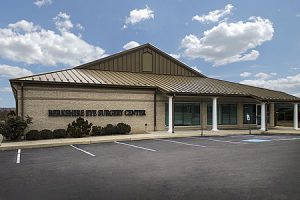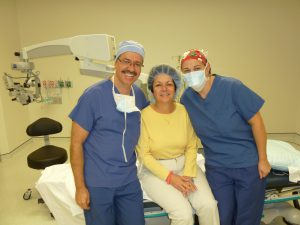
Ready to get cataract surgery in Wyomissing? Our cataract surgeons perform state-of-the-art cataract surgery, giving our patients excellent vision and a fast recovery. Through the amazing advancements in cataract surgery, patients who experience dull or blurred vision before surgery are able to see sharper, brighter images following surgery. And with today´s technology many can do so without dependence on glasses.

There have been many technological advancements in cataract surgery over the last 30 years. The days are past where cataract surgery requires a long hospital stay with weeks of bandaged eyes while you recover. Nearly 3 million cataract surgeries are performed annually in the United States, making it one of the most common surgical procedures. This effective and low risk surgery has wonderful life enhancing benefits for patients. What is done now at our surgery center is a simple out-patient procedure that usually takes several minutes and enables you to get back in the routine of normal activities within a day.
Keep reading the other Cataract tabs on this website to improve your understanding of Cataracts, the Cataract Surgery Procedure, and Lens Implant Options.
If you feel that you may have cataracts or if you have been diagnosed and wish to have a second opinion, please call our office today to make an appointment with one of our board-certified physicians and cataract surgeons: 610-372-0712.
About Cataracts
A cataract is a clouding of the natural crystalline lens of the eye. Vision with cataracts can be compared to looking through a piece of wax paper or a foggy window. Cataract development is usually a very gradual process of normal aging, but can occasionally occur rapidly. Many people are unaware that they have cataracts because the changes in their vision are so gradual.
Common Cataract Symptoms:
- Painless blurring of vision
- Hazy, cloudy vision
- Sensitivity to light and glare
- Double vision in one eye
- Poor night vision
- Fading or yellowing of colors
- Frequent changes in glasses or contact lens prescription
Steps to Solving Cataract Issues
1. Your cataract evaluation – First you must schedule a cataract evaluation. Our Berks County, Pennsylvania cataract surgeons can diagnose your cataract to determine the severity. Our surgeons will determine if it is time to remove the cataract.
2. How do you want to SEE after cataract surgery? If the doctors have determined that you have a cataract, the only way to solve the problem will be through cataract surgery. Do not be alarmed at this point. If any person lives long enough they will eventually develop cataracts. You will need to have a consultation with our cataract surgeons to determine how you want to see after surgery. Until recently, you could only gain vision at one distance. Now you have the option of advanced technology lens implants that can help you see at near, far and intermediate distances. These intraocular lenses are known as Advanced Technology Lens implants. Please see the Cataract Lens Implant Options page of this website for more details regarding IOLs typically offered by your Berks Eye Surgeon.
3. Schedule your surgery. Cataract surgery has evolved tremendously over the last 25-30 years. Healing times have been drastically reduced and patients go home the same day as the surgery. Please read below to get a better understanding of cataract surgery.
Cataract Surgery Treatment
Cataract surgery is safe and effective, with a 98% success rate. It gives people the ability to see clearly again, through a simple procedure that lasts minutes. In addition to the summary below, you can be assured your Berks Eye surgeon and the support medical staff will educate you on all steps in the process!
The Cataract Surgery Process
During cataract surgery, the natural lens of your eye is removed and replaced with a clear artificial lens called an intraocular lens implant. The surgical process involves a small incision, microsurgical, phacoemulsification technique. This means that the cataract surgery is performed using the smallest possible incision, and removal of the lens material is accomplished using an ultrasonic needle. Once the eye has been properly dilated, the eye is then prepared with a cleaning solution. Topical anesthetic is then administered to the surface of the eye. Next, under a microscope an incision of 3 millimeters or less in length is then created at the junction of the cornea (the clear structure on the front of the eye) and the sclera (the white part of the eye). Another dose of anesthetic is then administered inside the eye through this incision. The front part of the lens envelope, known as the lens capsule, is carefully opened so that the lens material can be removed. This is accomplished using a needle-like ultrasonic device, which pulverizes the hardened and yellowed lens proteins known as the cataract. The pulverized material is simultaneously vacuumed from the eye. Once the cataract material has been removed a foldable (IOL) intraocular lens is then inserted through the main incision and positioned into the lens capsule. The lens will remain inside your eye in this location without moving. Intraocular lenses cannot be felt or sensed in any way by the patient. Patients can now elect to have Advanced Technology Lens implants during the cataract surgery process that may enable vision without glasses after surgery. Please feel free to consult one of our physicians or staff members regarding this amazing new technology.
Your Cataract Surgery Location

Berks Eye completes most surgical procedures at Berkshire Eye Surgery Center, a fully equipped eyes-only ambulatory surgery center that provides convenience and comfort for our patients. Our center is accredited by the Accreditation Association for Ambulatory Health Care (AAHC), is Medicare certified, and specially designed to accommodate Cataract, Glaucoma, Cornea, Eyelid and Laser procedures.
After Cataract Surgery

Most patients are concerned about the cataract surgery recovery process. Our doctors provide the best quality care and thoroughly explain what you can expect after cataract surgery. Recovery from cataract surgery is generally very quick. Most patients obtain better vision within the first 24 hours of the procedure returning to normal activities the next day! Itching and mild discomfort are normal after cataract surgery. Some tearing discharge is also common. Your eye may be sensitive to light and touch. If you have discomfort, your doctor can suggest treatment. After one or two days, any moderate discomfort should disappear. Complete visual recovery varies from patient to patient but most patients return to their every day activities within one day. If you have cataracts in both eyes, the second procedure will most likely be scheduled within a week or two. Your doctor will schedule exams to check on your progress. Each person heals differently so it is important to discuss the cataract surgery recovery with your eye doctor.
 1802 Paper Mill Road, Wyomissing, PA 19610
1802 Paper Mill Road, Wyomissing, PA 19610

